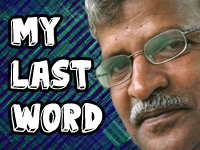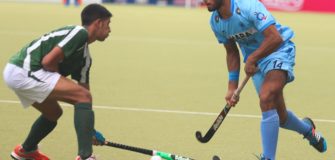MY LAST WORD: Will we consolidate the Incheon Success?
Share
MY LAST WORD: Will we consolidate the Incheon Success
MY LAST WORD: This is what a noted hockey official wrote in the mid 1960s. “…it cannot be denied that today hockey in India is no longer a premier sport. The reasons for this gradual decline are not far to seek. As a sport, hockey is not a part of the big business racket. It cannot offer a five-day glamorous ‘Test’ fare, in which thousands of spectators can throng as if they were witnessing a festival. For some unknown reason it lacks the popular hold which football has on the public, and does not possess a box-office appeal which can support fabulous cash prizes for players and professionals….”
Just replace five-day Test with T20 and Football with ISL, the text will now seem written the other day, not certainly 50 years ago which it was.
What Ashwini Kumar, connoisseur of hockey sport and also former president of Indian Hockey Federation, observed in 1964 after India witnessed two successive loss of gold in the Asian Games, stands appropriate even today.
Despite field hockey has its own surviving league after death of two of its ilk, and hosting any number of tournaments on its soils, and the FIH claiming to make India its global hub, the fact remains, and validates, the first line of Ashwini’s above text wrote under the caption ‘India has lost ground’ in the eminently readable work ‘The Book of Hockey’, by the British trio of David Wiggins, Patrick Rowley and Brian Lewis.
Yes Hockey in India is no longer a premier sport, and doesn’t have a box-office appeal.
Poor stands during leading tournaments held in Delhi recently, drop out of Ranchi Rhinos from Hockey India League despite huge on-field success, are instances to prove so if anyone has doubt.
It is against the backdrop of reality that one needs to look at the Incheon success.
Coming after India possessing two FIH Master coaches on its pay rolls, and giving the players a great deal of experience by hosting leading tournaments in the last two years, the Incheon success provide as a great relief.
The relief is laden with twin factors
Firstly, we qualified for the next Olympics, which otherwise entail national anxiety. The real Gold somewhat overshadowed by the Rio ticket, due to Chile OQ disaster.
Secondly, the fact and fear over the scenario that would have invariably developed had we not won the gold.
Coaching staff would have been sacked either by HI or the feeder SAI and the all the good work at elite level would have come to a stand still.
We will then be pushed back to square syndrome. Media will be busy as to who is the next coach!
The irritating cycle.
The Incheon success at least stopped such recurring nonsense, ensure continuity. This is most important for further progress and is the most significant of Incheon gains.
Secondly, the Gold though coming after missing out on three occasions, cannot be defined either watershed or defining moment for the simple reason that the whole of Asia is way behind European, and Oceania-ns in terms quality of game, and even quantity of players they have in their feeder base.
I would have written the same had Pakistan won the title instead of India.
The mere fact that though Incheon success got its due share of limelight, it does not reflect in the emotional outpouring of the nation as was the case when India won the gold in 1998.
Right from ‘Hotmail’ Bhatia to many others opened the strings of their purses to emotionally enjoin Dhanraj-Ballal team.
Conversely, We have not seen single private organization or individual coming up with anything, proving, if at all, the growing distance of hockey from masses.
This pass is much against what a great feat that had been achieved at Incheon.
India defeats Pakistan in the Final of Asian Games after a gap of 48 years.
Can now we say the country received the Himalayan success the way it used to or the scale does it deserve?
The answer will be mixed.
Mainly because both countries are not world leaders unlike in the past, in stead wallop somewhere in the bottom of G-15 in the world.
The advent of various leagues in India for every sporting discipline had taken emotional quotient of sport off, where only crude success count, that too success successively not once in a decade or two.
If at all, the media and the uncommitted sport (meaning non-fanatic hockey supporters) followers heaved a sigh of relief on the realization that hockey is not dead, still alive. There is a profound expression of satisfaction, not ecstasy unlike in the past where even a Sultan Azlan Shah Cup victory will bring tears on the cheeks of millions.
Indian hockey could have created great things had it capitalized the mood that the 1998 success ushered in, but it led it slip by, sacking Super Six players and robbing the next event, India-Pak test series, of its charm.
Past need not recur here, but the message is unmistakable.
Mere success doesn’t translate into eternity, transform its destiny unless built on.
There is therefore a greater need to build on the success.
Don’t just take the players to the doors of Corporate to get them more money. Instead take them to masses, say, colleges and branded Schools.
Motivate domestic tournament organizers, who keep hockey alive in every city and corner of the sprawling country, and ensure presence of these Goldies there ensure crowd and matching publicity.
In short, spread out is the message, not putting them into another camp for another tournament.
Use the occasion to enlarge base.
Approach Corporate for starting teams rather than co-sponsorship.
Approach government institutions to revive their teams, as most of them are only on paper.
Shake up University Hockey with a bit of incentive and see the sea change it can usher in.
What is required is many such things.
With a professional CEO at its appropriately staffed organization, Hockey India can headstart in many directions to make hockey truly national sport, some of which are mentioned above.
More so against the backdrop that the office-bearers of HI have ensured their bulk continuity with another four-year term granted in the latest Congress.
Its time for Narinder Batra, who elevated himself from Secretary General to President of HI, need to enlarge vision, entertain bigger goals, and prove the historical chance he has got to become a leader of wisdom, to make hockey truly a national sport, rather than turn into angry, indignant leader of a National Federation, however provocative the situation is.
Whether he and his brainchild Hockey India will do the best or rest in laurels is the moot point.
We are optimistic as usual.



